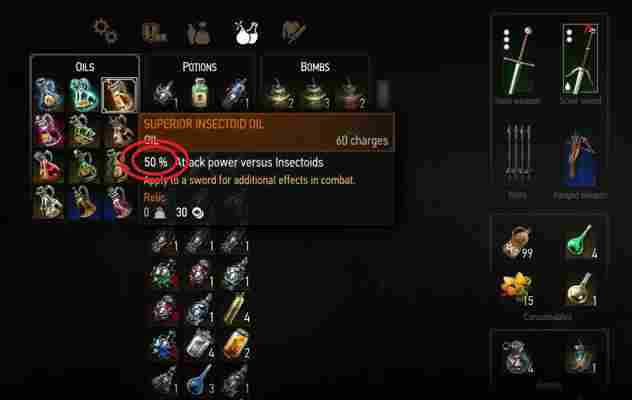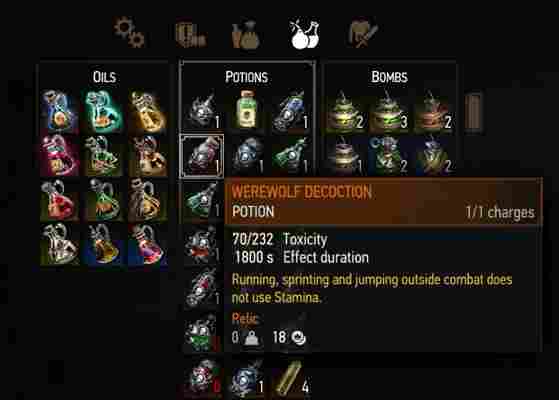The Witcher series puts the player in the mud-stained boots of the grim and gritty Geralt of Rivia: A ladies’ man, a cunning hunter, and a master swordsman. As such, when it comes to combat and allocating perk points, a lot of players will gravitate towards increasing Geralt’s skill with his blades or the potency of his combat signs like Quen or Igni.
The game mechanic and corresponding skill tree that’s often overlooked is alchemy , as is the case in so many fantasy RPGs. But is it deserving of this treatment in The Witcher 3: Wild Hunt?
Let’s find out.
Oh, and if you’ve been living under a rock and haven’t gotten around to playing Witcher 3 yet, here’s a download link for you:

Unlike other famed video game protagonists, Geralt of Rivia is not a one-man army. He’s not Dragonborn, he’s not Starkiller, he’s not Kratos. He’s not immortal, he’s not blessed by the gods. Geralt is defined by his witcher training and by his years of experience, and he bears the scars from both.
It’s one of the things we love about him the most – Geralt has made it this far largely because he’s resourceful, knows his quarry, and plans meticulously. This is precisely why alchemy goes hand in hand so well with being a witcher.
Use oils for a leg up
Your swords can cut down humans and monsters alike, but the longer the skirmish takes, the longer you’re at risk of getting walloped by a golem, or blinded by a water hag. Trust us – neither is a situation you want to find yourself in. In this way Geralt is like the Batman of fantasy RPGs:
He’s brooding, he’s somber, and he knows to strike when he has the best chance of coming out on top. Proper planning is key when going up against harder creatures – particularly on the game’s higher difficulties.

Endrega nest giving you trouble? Try putting insectoid oil on your silver sword. Superior insectoid oil will add a mighty 50 percent increase to your damage every time you hit an insectoid monster, and will last for 60 hits. Could you defeat the monsters without using it? Probably, but the fight will take longer and every time you get hit your equipment will degrade. Why make things harder on yourself and on your wallet?
Alchemy is best used in tandem with the in-game bestiary. What’s so cool about the Witcher’s monsters is that every creature has its resistances and its weaknesses. Exploiting an enemy’s weakness is what witchers were trained to do. Approach a fight with the proper oils applied and you’ll see why they treat preparation so importantly.
Decoctions are more than just trophies
There are two types of potions you can use in Witcher 3: Potions and decoctions. Potions are more run-of-the-mill and primarily serve as temporary buffs: Full Moon increases your maximum vitality for a full minute; Black Blood damages vampires and necrophages whenever they wound Geralt. Useful for sure, and definitely not to be underutilized. Decoctions, however, take it to the next level.

Decoctions are created with rare ingredients, some of which you’ll only come across once in a playthrough. These are things like mutagens found on unique earth elementals, forktails, leshens, or werewolves. In other words, it’s not stuff you’ll find a street peddler selling! You can, however, buy formulae. Learn the formula to make a decoction for one such creature, and once you acquire the proper ingredients you’ll be able to craft it.
Decoctions can do a variety of things, ranging from increasing Geralt’s vitality per kill, to growing attack power over the course of a fight, to even things like unlimited sprint or jump outside of combat. Each decoction is completely unique, and every one you get adds another tool to your arsenal. By mid-late game you’ll want every bit of help you can get.
Are bombs even useful?
Yes. Oh, yes they are.
If you’re uninspired by a lackluster grapeshot or dancing star, remember that these, too, need to be upgraded as you progress further in the game! A superior Devil’s Puffball will last 20 seconds longer than a regular one, and in the heat of combat, that difference is huge. Additionally, much like the oils, certain monsters will have vulnerabilities to different bombs. Learn how to craft each one and keep them upgraded as often as your budget will allow.
Don’t be afraid of running out of supplies
This is a big one. To players who are leery of using bombs, oils, and potions because it’s a finite resource, we hear you. You’ll be thrilled to know that this is not the case! When we saw that our griffin decoction had only one use, we were prepared to horde it until the final boss. Imagine our excitement when we learned that decoctions, potions, bombs, and oils can all be resupplied very easily.
Any time you meditate (accessible from both the RPG menu and from the combat wheel (LB on controller)) it will replenish all of your used supplies, provided you have strong alcohol on your person. This means items like alcohest, dwarven spirit, or mahakaman spirit.
If Geralt has even one of these in his inventory all your stuff will be capped off for immediate reuse. Strong alcohol can be found practically anywhere, too. Just open a barrel in the nearest city or talk to a traveling merchant. There’s no reason to be shy about using your supplies!
How does this toxicity meter work?
Witcher or not, the potions and decoctions Geralt imbibes are still toxic and would kill lesser men. Check out this description of the trial of the grasses to see what we mean.
Every potion and decoction has a toxicity level and will fill up that much of the green bar you can see on either the HUD or from the inventory screen. As long as your combined potions fall within Geralt’s limit, you can use varying combinations of effects. Use this to stack buffs like increased damage or vitality regen.
Is it worth your points or your mutagens?
It really depends on your build. For those who are unfamiliar with how to use mutagens, the short explanation is that they can give you an increased buff if they’re put next to corresponding skills you have equipped. For example, red mutagens increase Geralt’s attack power. The more powerful the mutagen, the higher the bonus. Likewise, if that mutagen is modifying three equipped abilities the overall bonus it gives is stronger than if it was just modifying one or two.
Complicated? A little bit. Check out this picture:
The green mutagens you harvest are buffed by your equipped alchemy perks. As you can see, our Geralt has an extra 450 vitality just from two equipped alchemy perks. That can make a surprising difference in a fight. Obviously, this isn’t even doable unless you have the alchemy perks to begin with, so yeah you’ll have to equip a couple. Again, it’s all about the build you want. If you’re trying to tank, wear heavy witcher gear and stack your alchemy mutagens for a truly massive vitality bonus.
As for the alchemy perks themselves, we found they were all quite useful, especially when stacked. Fixative, for example, gives blade oils more charges before wearing off. Pyrotechnics adds or increases damage to all your bombs. The question wasn’t so much whether we liked the perks, but more whether we valued them over our martial skills. That much is up to you to decide. If you’re interested in seeing what a full-out alchemy build would look like in The Witcher 3: Wild Hunt, check out this video:
We hope this guide will help players feel a little love for alchemy in The Witcher 3, and that you’ll consider its perks and gameplay on your playthrough! Now harvest some pringrapes and get back on the trail!
More from Softonic
5 best Telltale games ►
How to prepare for World of Warcraft's Battle for Azeroth ►
Beginner's guide to Slay the Spire ►
Beginner’s guide to Sea of Thieves ►
